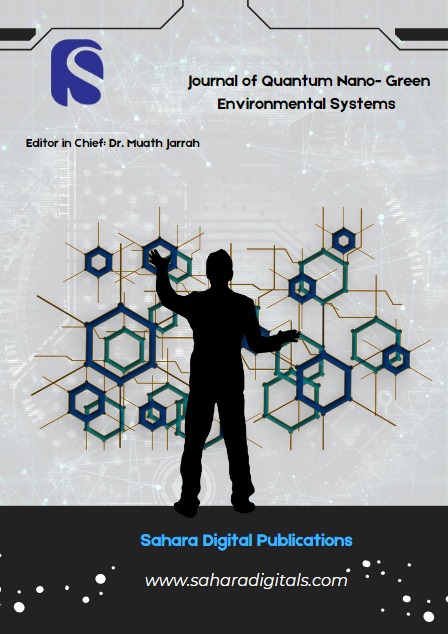Title: REINFORCEMENT LEARNING STRATEGIES FOR DEVELOPING SMART QUANTUM NANOMATERIALS TO ENHANCE CIRCULAR ECONOMY AND WASTE MANAGEMENT SYSTEMS

Journal of Quantum Nano- Green Environmental Systems (QNGES)
© by QNGES - Sahara Digital Publications
ISSN: 3079-6210
Volume 01, Issue 01
Year of Publication : 2025
Page: [25 - 37]
Authors :
Sheikh Thippa and Yang Derek
Address :
Mimos Technology Solutions Sdn. Bhd, Technology Park Malaysia, 57000, Kuala Lumpur, Malaysia
National University of Singapore (NUS), Singapore
Abstract :
The circular economy and waste management systems for household wastes encounter major obstacles such as ineffective recovery of resources, restricted scalability, and a high environmental impact. Materials utilized in these systems are typically developed via time-consuming and resource-intensive trial-and-error approaches. Unfortunately, these methods do not optimize material performance for complicated applications. The remarkable characteristics of quantum nanoparticles make them very promising candidates for tackling these problems, but they necessitate creative and flexible approaches to development. The paper proposes that RLQNWMCE aims to utilize reinforcement learning (RL) to enable the design of smart quantum nanomaterials (QN) that enhance waste management (WM) efficiency and promote sustainability in circular economy (CE) practices. Applying an RL model, the RLQNWMCE technique optimizes and predicts quantum nanomaterials' structural and functional features under various synthesis circumstances. The model repeatedly uses actual and simulated datasets to improve material performance while integrating multi-objective optimization to address cost, energy usage, and environmental effects. According to the findings, the catalytic efficiency for pollution cleanup is 35% better and the synthesis waste is 20% lower than conventional approaches. Resource recovery rates in recycling processes are improved by 40% using the RL model, which effectively tackles major issues in waste management systems. Findings from this study suggest that reinforcement learning offers a practical approach to creating complicated quantum nanomaterials that can sidestep conventional limitations and ultimately lead to more sustainable circular economy practices.
Keywords :
Circular Economy, Waste Management, Quantum Nanomaterials, Reinforcement Learning, Resource Recovery, Sustainability
